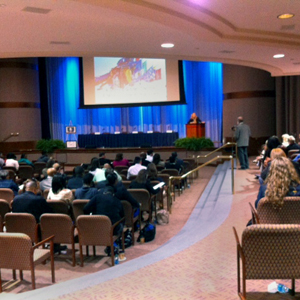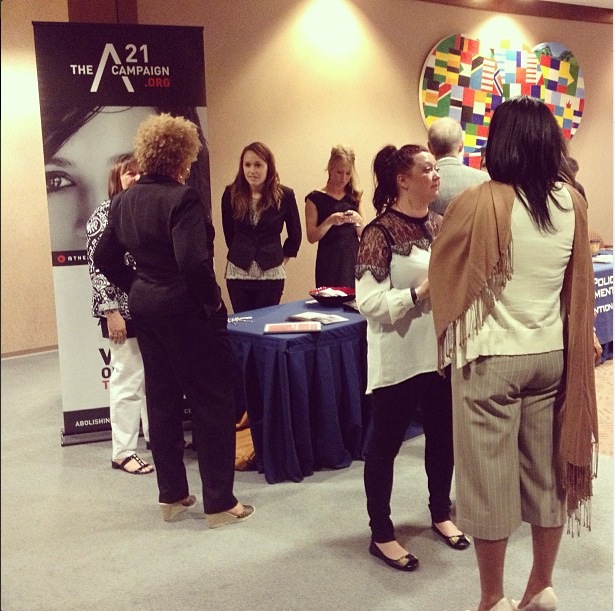 Starting this fall, students in a pilot program for Georgia high schools are set to start learning about child sex trafficking. It’s part of a trend that may make Georgia a leader in fighting the crime.
Starting this fall, students in a pilot program for Georgia high schools are set to start learning about child sex trafficking. It’s part of a trend that may make Georgia a leader in fighting the crime.
“Georgia has one of the most prevalent problems in the country” with child sex trafficking, in part because the state is a major crossroad of freeways and airlines, said Joel Thornton, chief of staff at the Georgia Department of Education and organizer of a May 13 and 14 sex trafficking conference attended by 324 school personnel, mainly from Georgia. Thornton has organized similar conferences before, but this one is the biggest so far.
“The thing that surprised me most when I started looking into this two or three years ago was that it was a lot more Georgia kids than I thought,” said Thornton. “I had assumed it was international kids passing through our airport.”
Separate but complementary to what’s going on at DOE, the Georgia Attorney General’s office earlier this year launched a multi-agency anti-child trafficking campaign called “Georgia’s Not Buying It.”
 It’s difficult to count the number of trafficking victims for lots of reasons. For example, the pimps run completely record-less underground businesses; different jurisdictions charge, handle and count child prostitutes differently. But Thornton said the numbers he hears there are about 400 children are trafficked per month in Georgia.
It’s difficult to count the number of trafficking victims for lots of reasons. For example, the pimps run completely record-less underground businesses; different jurisdictions charge, handle and count child prostitutes differently. But Thornton said the numbers he hears there are about 400 children are trafficked per month in Georgia.
“We believe that Georgia will be a true catalyst for change,” said Kristen Morse, social justice coordinator for The A21 Campaign, an anti-child trafficking nonprofit with offices on five continents. They are also writing the curriculum that Georgia schools will pilot.
The draft, now under review by the state DOE, consists of worksheets, class discussions, videos and other materials.
It’s not yet clear which classrooms will run the curriculum: history, health, independent study or something else. One possibility is to tie it to lessons about antebellum black slavery in the south.
While A21 is piloting their curriculum in schools in other states, Georgia’s is their first partnership with a statewide agency.
Dave McCleary from the Roswell Rotary Club applauded putting the subject in schools. “Kids need to understand these dangers that they face,” he said. His organization is also taking up the child sex trafficking fight. They already have a presence in many high schools via Interact, the Rotary-sponsored after-school service club.
 Deborah Sigmund, founder and director of Innocents at Risk, said when she speaks at schools, she’s often greeted with bewilderment. “Our children in the United States do not think this is a problem. You might question high-schoolers, middle-schoolers; they think this is [a] thing that happens over in India.”
Deborah Sigmund, founder and director of Innocents at Risk, said when she speaks at schools, she’s often greeted with bewilderment. “Our children in the United States do not think this is a problem. You might question high-schoolers, middle-schoolers; they think this is [a] thing that happens over in India.”
While she’s based in Washington, D.C., one of her projects has great resonance in Atlanta because she helps put watchful eyes in one of the world’s busiest airports.
Flight attendants can be easily trained to recognize shady passengers like, say, an 18-year-old man alone carrying a day-old newborn with no more supplies than one bottle and two diapers shoved in his pocket. In partnership with a frustrated flight attendant who got no response when she reported such a man to authorities, Innocents at Risk started targeting airline staff and administrators and federal law enforcement and telling them to pay attention.
Now, thousands of flight attendants, either through their employers, law enforcement, or each other, have learned the warning signs. And they have a hotline number that summons authorities to meet landing airplanes.
But Georgia’s number one industry is agriculture. That means trafficking is not just about Atlanta and urban areas. Author and journalist Christine Dolan said, “You have to take into account migrant workers.”
Part of some migrant camps are children trapped as prostitutes, forced into rapes sometimes dozens of times a day.
And Dolan, formerly with CNN, chided the media for tip-toing around the reality of child abuse by using words like “inappropriate touching.”
“We’re talking about ‘evil,’” she said.
Dolan also recommended in general that children must be protected from predators on the Internet and that the public demand tough prosecutions for child pornography.
Georgia’s legal climate is somewhat less comfortable for traffickers than some other states. Like most states, Georgia requires teachers and other school personnel to contact law enforcement if they see signs of child abuse. It also allows forfeiture of convicted pimps’ and traffickers’ property. And while minors under the age of consent can still be charged with prostitution, new laws strengthen their legal option to argue that they are victims, not perpetrators.
Photo credits (top to bottom): Georgia Department of Education’s child sex trafficking conference in Atlanta, photo courtesy of the Georgia Department of Education; Joel Thornton of the Georgia Department of Education, photo by Maggie Lee; Kristen Morse (center, black jacket) of The A21 Campaign speaks to conference attendees, photo courtesy of the Georgia Department of Education.

























